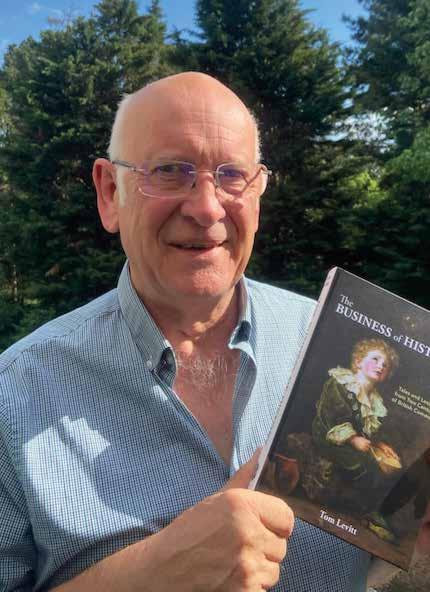
2 minute read
The Business of History
By Tom Levitt
In 1925 William Beable published Romance of Great Businesses, thirty-two pen portraits of iconic businesses of the day. They included pioneers in manufacturing; Colman’s mustard, Dunlop tyres, Hovis wholemeal bread. Pioneers in retail; Gamage, Boots, WH Smith. Service providers included Mudie’s circulating library and several publishers. Some tales are wellknown, such as that of William Lever (later Unilever), although others, like Swift Motors, Martin’s cigars or Mudie’s itself, have faded into obscurity.
Here in West London both Glaxo and Lyons were Greenford-based in the early 20th century, whilst Pears soap once resided in Isleworth. Glaxo (later GSK) made baby formula up to the 1920s when they switched to pharmacy. Lyons provided exhibition cafes, then tea rooms, before focusing on baking whilst Pears, absorbed by Lever in 1919, changed the face of advertising.
“This recognition is a testament to the ingenuity and hard work of our team and the amazing success of the Tessera SX40, which has also been recognised with other major awards including an Emmy from the Television Academy based in Los Angeles. Brompton continues to focus on innovation to meet the needs of our customers and delivering quality and reliability, backed up by 24/7 technical support.”

The latest accolade follows Brompton Technology being recognised by the Television Academy with an Emmy Award for Outstanding Achievement in Engineering, Science and Technology, awarded for its Tessera SX40 LED video processor.
The King’s Awards for Enterprise, previously known as The Queen’s Awards for Enterprise, were renamed in 2023 to reflect His Majesty The King’s desire to continue the legacy of HM Queen Elizabeth II by recognising outstanding UK businesses. The Award programme, now in its 59th year, is the most prestigious business award in the country, with successful businesses able to use the esteemed King’s Awards Emblem for the next five years.
The Pears family used to live in Spring Grove House, which is now part of the West Thames College campus in Isleworth and the Chambers has its office in Spring Grove House.
Beable’s 32 subjects inspired my new book, The Business of History: Tales and Lessons from Two Centuries of British Commerce. However, his bowdlerised accounts omitted controversy – Cadbury’s and slavery, industrial unrest at Bryant & May and Horrockses, a murder and several frauds. His biggest omission was analysis. Businesses 150 years ago weren’t significantly regulated. Early shareholding was for long-term investors, not a shortcut to ownership or control; share trading was modest until under a century ago. Families once owned thirty of the thirty-two companies: the very word ‘company’ means ‘those who break bread together’.
I built on Beable’s foundation by exploring more comprehensive data, analysing it and bringing the stories up to date.
The book employs an ESG framework, changes in Governance being a dominant theme. Early businesses played a role in Society, highlighting the religious and political motivations of early business leaders, though the Environment was mostly ignored, deliberately so for 50 years post-WW2. That George Cadbury did not wish his employees to live ‘where a rose cannot grow’ was exceptional in Victorian times. The ‘greenhouse effect’ was observed in 1896 yet it took 100 years for fuel-using businesses to respond. https://londonpublishingpartnership.co.uk/ books/the-business-of-history/

The later twentieth century saw tumult as shareholder value, private equity and Friedmanite philosophy eclipsed family values in the ownership of larger firms. Only four of the thirty-two exist independently today; eight have disappeared completely. The remaining twenty survive only as brands, intangible commodities, readily bought and sold.
I enjoyed writing the book. I hope it will entertain both the business community and the general curious reader.











